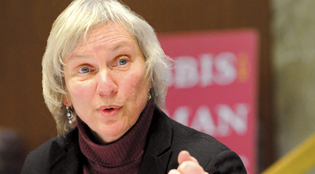 loading
loading
MilestonesA maker of historyRemembering Paula Hyman.  Courtesy Stanley RosenbaumProfessor Paula Hyman, a pioneer of American Jewish women's history, died in December. View full image
It was my junior year, but I did a sophomoric thing. In hopes of meeting some comely young Jewish women, I signed up for a course called Women and Judaism, taught by a professor named Paula Hyman. The odds were good—three men and nine women in a small seminar room—but, alas, no romance came of it. Instead, I got an introduction to one of the professors who would change my intellectual life. After a semester in Hyman's rigorous class, reading texts from biblical times through Third Wave feminism, I was more certain than ever that I wanted to attend graduate school in religious studies. Three years later, I was back at Yale for a doctorate, and Paula was one of my advisers. Later, she was my neighbor in the Westville section of New Haven, and I would see her every Saturday at Beth El–Keser Israel, the synagogue where she was a stalwart. Paula, who died on December 15 at the age of 65 after battling cancer over several decades, was the Lucy Moses Professor of Modern Jewish History. But she did not just teach history; she made history. As a brilliant Radcliffe alumna doing graduate work in the mid-1970s, she and several other women were instrumental in pressuring the Conservative movement of Judaism to give women equal roles in the synagogue service. When in 1985 the movement ordained its first female rabbi, Paula and her cohort deserved much of the thanks. Her early scholarship was on French Jewry, but it was her pioneering work on gender, in books like Gender and Assimilation in Modern Jewish History, that changed the field of Judaic studies. "The field of American Jewish women's history as a scholarly enterprise owes its origins to Paula Hyman," Hasia R. Diner, the New York University historian, told the New York Times. Her influence ripples on. Her former graduate students are teaching across the United States. She leaves a husband, two daughters, and two grandchildren. The grandchildren are twins, a boy and a girl—whose status in the Jewish world is far more equal than it would have been without their grandmother.
The comment period has expired.
|
|